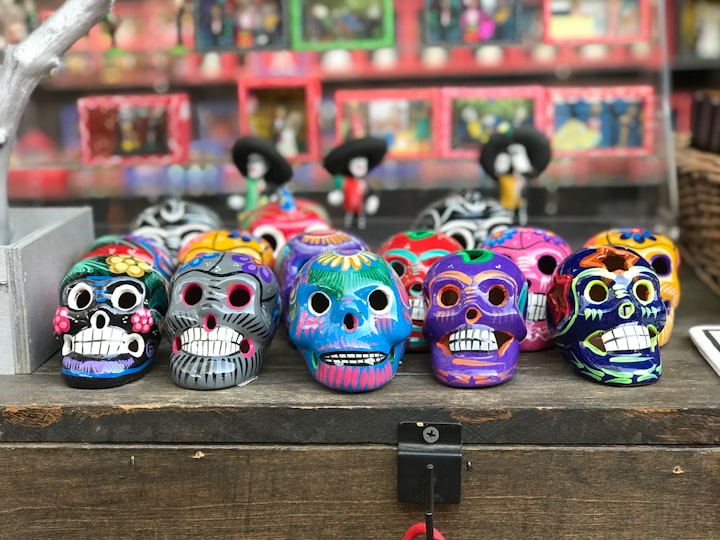It’s the End of the World As We Know It
H.D. Poem 35

Hilda Doolittle’s poems are works of spirituality within many different religions that crossover and work together to create a whole image of divinity in her work. Poem 35 of The Walls Do Not Fall section of the Trilogy book references the mythology of Egyptian and Greek Pantheons to create a spiritual and religious atmosphere as she questions the world and how we can change ourselves to make it better.
I read this poem as a letter or address to the public, condemning materialism in society and going back to the old religions instead of worldly possessions. Doolittle writes in her first stanza, “Let us substitute/ enchantment for sentiment,” (Lines 1-2, 48), taking the ideals that people might think of as magical and otherworldly to make them real. Sentiment implies a deeper, more intimate feeling than enchantment. Enchantment is superficial, attributing to something less of human emotion. Enchantment over the world gives a quaint love or infatuation rather than the sentimental kind of love that leave someone wanting so much more and the comfort that comes with the sentiment.
The second stanza asks the reader to “re-dedicate our gifts/ to spiritual realism,” (Lines 3-4, 48), including the reader in the same group as the speaker. The idea of giving the gift of talents or personal actions is no new. It is a tactic used commonly in Evangelical churches to persuade their congregants to serve their church or higher power in any way they can. If everybody has a gift, then no one can say that there is no way that they can serve their deity or religion of choice. Of course, we can take this more literally as material gifts per the sacrifices and offerings most commonly associated with most religions, but I do not think that is what Doolittle wants from us.
Spiritual Realism is an unknown term outside of the poem or self-help philosophy books. Oxford English Dictionary does not even have a definition of it. I even asked two different philosophy majors about it, to no avail. If Magical Realism is when we authors take magical and fantastical scenarios and treat them as if they are normal occurrences, then Spiritual Realism is the act of treating spiritual occurrences as the norm. Doolittle invites the reader to live a spiritual existence where the reader can experience the unknown and not have to fabricate or discover a reason behind it. I see it as a call to live in the moment instead of focusing on what made that moment happen. Doolittle asking us to use our gifts in the sense of spiritual realism asks us to put forth ourselves into the world around us as well as our whole hearts into our spiritual beliefs.
Doolittle tells the reader to offer incense to Thoth and Hermes, the same god in different cultural pantheons, to call upon the wisdom they offer. Doolittle writes, “invoke the true-magic,/ lead us back to the one-truth,” (Lines 11-12, 48). There is an essence of something larger than what the human mind can grasp. What is the “true-magic” and “one-truth” that Doolittle speaks of? What does she know that the reader does not? Or, she only knows that she is searching for one true meaning of life or spiritual experience that would make the pain of life all worth her existence.
There is a need to find something more significant than what we can comprehend. Doolittle writes this during her time in London, experiencing World War 2 and witnessing the horrors and questions that come with war. In a time of mass casualties and seemingly endless loss, what can someone do to lessen the feeling that there is no point in our life? Who gets to choose who lives and dies? Why are average men given the power to send a man they will never know out into a battlefield on behalf of the men safe in their rooms organizing raids like little boys playing a game of chess?
The “one-truth” connects all humankind instead of enabling the tendency to focus on the individual self. Doolittle’s poem is a plea to all mankind, not just herself or her loved ones. There is one true meaning to life and the loss that is being experienced, but we have to look for it in spirituality because there is nowhere left to look in the eyes of the speaker.
Doolittle goes on with “let him (Wisdom)/ in the light if what went before,” (Lines 15-16, 48), in which Wisdom is also Thoth and Hermes, a higher power. If we put our faith in something that can control what we cannot, we can surrender our human need to find a reason for the things we cannot explain. Doolittle counters this at the same time, asking an almighty being for the answers that the speaker lacks.
The light that Doolittle writes about could be a call back to a more peaceful past. This could be a callback to her own life or to a time in history that she thinks exemplifies the peace that she is seeking. She has a hope that there is a light that can we can be returned to as a human race, but the reality of the history of the human race is that we have always been terrible. Is that not the point of so many religions? They start with the hope that this new deity will be able to keep morals because of its omniscience and judgment, but then people go back to being terrible and use their deity to justify it. There is no before. There is only now, and each new generation has to reckon with the damage their ancestors brought forward that pile up over centuries leading to wars like the one Doolittle is experiencing and the ones we experience now.
The next stanza adds, “illuminate what came after,/ re-vivfy the eternal verity,” (Lines 17-18, 48). There is no context to what after is. What came after what? What big event is this referring to? Is it referring to anything? The Big Bang? The past and the present, before and after, cause and effect, keep the human race from making life-altering decisions and making the decisions anyway. There is a binary way of thinking exhibited here instead of an endless sort of thought. Even the deity of Wisdom that the speaker calls upon knows of a before and after, but if the deity was so all-encompassing and powerful, why does there have to be a before and after? As human beings, we only know what we know. The speaker can only express a before and after because we are bound by the constructs of time that we created. We have put ourselves into a situation that we cannot make our way out of. We as a human race, are all-encompassing in that we have imposed our values and beliefs on each other repeatedly without consideration.
Wars are fought to prove morality as people die to prove themselves right. The speaker who I believe to be Doolittle herself expresses the deep need for the human race to reinvigorate the morals that need to be abided. Then, maybe peace can be upon the world, and the wars will stop. The verity, a moral that should be deeply ingrained in all of the world’s citizens, is claimed to be known by so many, and yet there is no agreement on what set or morals we should be living by. We need the deep sentiment and longing for spirituality within the human race, because we will not take care of ourselves or others without it. Without the thought that some higher power may be watching or that there is a sort or spiritual awakening in the process of our own enlightenment, why is there a purpose to live? Some people can live without spirituality, but in the end, humans are feeble creatures that need to have some sort of hope to keep going so when the body count keeps rising in a war that you can do nothing about, there is an understanding that we are helpless in the situation and something has decided that is so.
I read this poem as a way to tell the reader to give back to the people around us in a spiritual way. We can give back material things, but material things can only go so far on a person’s journey through life. Mental health should be nourished, and in the case of the 1940s, spirituality was probably the best way to get any sort of mental health treatment. We saw through Ginsberg’s works that mentally ill people were not treated nicely.
We need to have a deep sentiment with the people around us instead of quaint infatuation and parasocial relationships that separate us more from our peers than unite us. I think I liked this poem because I see it more as my connection to religion that the connection I was told I was supposed to have. I think we should be more focused on the people around us and how to do good for our neighbors on Earth before we should start worrying about our salvation. The individualist approach to salvation in religions is dirty and tainted to me. If you are only doing good to get into whatever afterlife you want, then what is the point? You are not doing it to be helpful or selfless or simply because it is the right thing to do if you are only wanting to make sure some higher power saw you doing what you are supposed to do. I like that this is through a focus of other religions rather than the Christian theology that I am sure that England had at the time because of their colonialist history.
I want to do more for my community. I am a pretty community based already, but I still wonder how I can do more for the students I work with. I think at the same time that I need to set some sort of boundaries with myself so I do not burn out before I make a real difference. I am not sure that I make any differences or that I have a true moral compass, but I do know that being a human being is a mess of emotions and decisions that are hard to figure out and that there is no easy way to contact Wisdom and ask him to lead me the rest of the way. I think this poem is meant to ask us to reflect on what we give and to do so for the sake of giving. Our talents are a way we can give back to each other, because in a capitalist hellscape, sometimes it is hard to give financially. We need to take care of each other just because we are human, and for no other reason.
Works Cited
D., H., and Aliki Barnstone. “The Walls Do Not Fall.” Trilogy, New Directions, New York,
1998.
About the Creator
Miss Ghoul
Credentialed English teacher






Comments
There are no comments for this story
Be the first to respond and start the conversation.